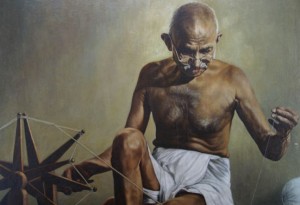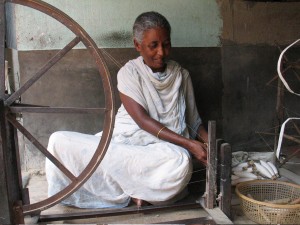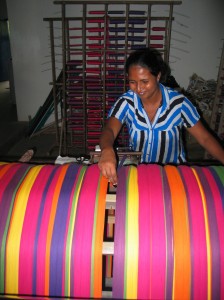Being The Change We Wish to See in the World
Today is Gandhi Jayanti, which is the birthday of Mahatma Gandhi. At Sevya, we draw much inspiration from the wisdom and visionary leadership of Mahatma Gandhi. He was a beacon of political, economic and spiritual freedom, and spearheaded a non-violent movement for India’s self-reliance and independence.
It is important to understand that Gandhi’s vision of freedom was not merely that of political independence, but one embedded deeper into the socioeconomic and spiritual fabric of human society. The “Charkha” or spinning wheel represents Gandhi’s movement for India’s self reliance and he encouraged people throughout India to stop buying cotton fabric made in British textile mills and go back to producing their own cotton, which is the hand spun, hand-woven cotton fabric known as “Khadi”.
As Gandhi says, “Charkha is the symbol of the nation’s prosperity and therefore freedom. It is a symbol not of commercial war but of commercial peace. It bears not a message of ill-will towards the nations of the earth but of goodwill and self-help. It will not need the protection of a navy threatening a world’s peace and exploiting its resources, but it needs the religious determination of millions to spin their yarn in their own homes as today they cook their food in their own homes…For every revolution of the wheel spins peace, goodwill and love. And with all that, inasmuch as the loss of it brought about India’s slavery, its voluntary revival with all its implications must mean India’s freedom.”
For him, the spinning of the Charkha represented a deeper philosophy based on:
• A spiritual means to identifying ourselves with others by ruling out exclusiveness, inculcating humility and casting out pride completely
• An economic tool of regeneration to end unemployment by removing idleness, and to prevent exploitation by building self-sustenance in the face of increasing economic inequality
• A political symbol of hope and of a sustainable society built on foundations of dignity
Sevya is committed to imbibing this philosophy of the Charkha in our everyday lives. The natural silk, cotton and wool yarn used to make Sevya’s collection of fair trade scarves is hand spun and then hand-woven on pit looms by artisan communities throughout villages in India. Our fair trade stuffed animals are also made from hand spun, hand-woven cotton fabric. This entirely handmade process provides sustainable livelihood to thousands of artisans throughout rural India and Sri Lanka and ensures a healthy and growing local economy. The spinning wheel represents a fundamental axis of village life, where local cottage industries are intact and thriving, and where human dignity, as well as the earth’s natural resources, are cherished and maintained.
The global financial crisis of 2008-09, the socio-political movements such as Occupy Wall Street and Arab Spring, and the resurgence of global debate on climate change and ecological loss have all fundamentally ruptured the business order on which the world has functioned till date. There is a growing global awareness that there cannot be a return to “business-as-usual” practices, which are politically, socially, ecologically and economically unsustainable. It is time for a fundamental paradigm change – such as the one envisioned by Gandhi.
In his own words, “India’s destiny lies not along the bloody way of the west, of which she shows signs of tiredness, but along the bloodless way of peace that comes from a simple and godly life. India is in danger of losing her soul. She cannot lose it and live. She must not, therefore, lazily and helplessly say, ‘I cannot escape the onrush from the west.’ She must be strong enough to resist it for her own sake and that of the world.”
At Sevya, we are deeply committed to this change. Each purchase of a Sevya fair trade product supports equal opportunity, and more importantly, equal dignity for rural artisans and helps to ensure that India does not “lose her soul”.



